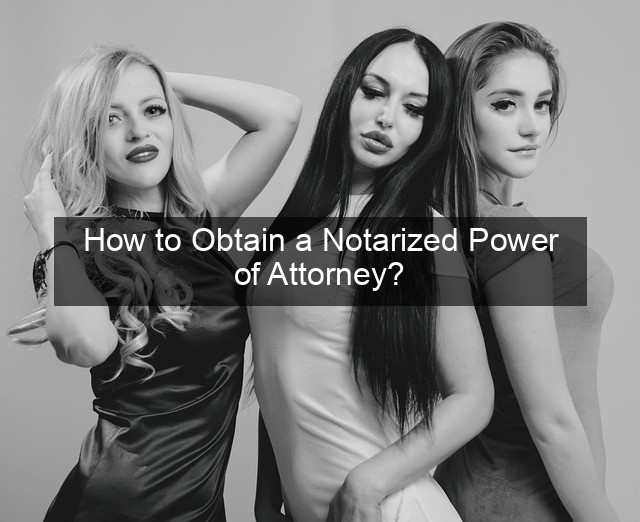How to Obtain a Notarized Power of Attorney?
- How to Obtain a Notarized Power of Attorney?
- Understanding the Importance of a Notarized Power of Attorney
- Why Notarization Matters
- Types of Powers of Attorney
- Choosing the Right Agent
- The Process of Obtaining a Notarized Power of Attorney
- Drafting the Power of Attorney Document
- Finding a Notary Public
- The Notarization Procedure
- Safeguarding Your Power of Attorney
- Storing Your Document Securely
- Revoking a Power of Attorney
- Conclusion
- Frequently Asked Questions
- What is the cost of notarizing a power of attorney?
- Can I notarize my own power of attorney?
- What happens if my agent misuses their power?

How to Obtain a Notarized Power of Attorney
Navigating legal matters can often feel overwhelming, especially when dealing with situations requiring a power of attorney. A power of attorney (POA) is a crucial legal document that grants another person, known as your agent or attorney-in-fact, the authority to act on your behalf. This can range from managing finances and property to making healthcare decisions. However, a simple POA isn’t enough in most cases; it needs to be notarized. A notarized power of attorney adds a layer of legal validity and security, ensuring its enforceability and protecting you from potential fraud. This comprehensive guide will walk you through the process of obtaining a notarized power of attorney, providing clear, step-by-step instructions and answering frequently asked questions to empower you with the knowledge you need.
Understanding the Importance of a Notarized Power of Attorney
Why Notarization Matters
Notarization serves as a vital safeguard against fraud and ensures the authenticity of your power of attorney. A notary public, an impartial third-party official, witnesses the signing of the document and verifies the identity of the principal (the person granting the power). This process validates the signature and affirms that the principal is signing the document willingly and under their own volition, not under duress or coercion. Notarization adds an official stamp of approval, making the document legally binding and readily accepted by institutions like banks, government agencies, and healthcare providers.
Without notarization, your power of attorney could be challenged, potentially leading to delays, legal disputes, and the inability of your agent to act on your behalf. This is particularly crucial in sensitive matters like financial transactions or medical decisions where clarity and legal validity are paramount. Imagine the complications if your agent couldn’t access your bank account to pay bills during a medical emergency simply because the POA lacked notarization.
The notarization process provides a record of the signing, further bolstering its legal standing. This record, maintained by the notary public, can be invaluable in resolving any future disputes about the document’s authenticity or the circumstances surrounding its execution.
Types of Powers of Attorney
There are various types of powers of attorney, each designed for specific purposes. A durable power of attorney remains effective even if you become incapacitated, ensuring your agent can continue managing your affairs. A limited power of attorney grants authority for a specific task or period, such as selling a property. A medical power of attorney, also known as a healthcare proxy, allows your agent to make medical decisions on your behalf if you are unable to do so yourself.
Choosing the right type of power of attorney depends on your individual needs and circumstances. Understanding the differences between these types is crucial to ensure your wishes are carried out effectively. Consulting with an attorney can provide personalized guidance in selecting the most appropriate power of attorney for your specific situation.
It’s important to remember that the notarization requirements may vary slightly depending on the type of power of attorney and the jurisdiction. Always check with your local notary or legal professional for specific guidelines.
Choosing the Right Agent
Selecting an agent, also known as your attorney-in-fact, is a significant decision. This individual will have the authority to act on your behalf, so choose someone you trust implicitly. Consider their reliability, responsibility, and ability to handle the tasks you’ll entrust them with.
Discuss your wishes and expectations with your chosen agent thoroughly before granting them power of attorney. Ensure they understand their responsibilities and are willing to accept the role. Open communication and clear understanding are essential for a smooth and effective working relationship.
It’s also wise to name a successor agent in case your primary agent is unable or unwilling to serve. This provides a contingency plan, ensuring your affairs are managed even if your first choice becomes unavailable.
The Process of Obtaining a Notarized Power of Attorney
Drafting the Power of Attorney Document
You can obtain a power of attorney form from various sources, including legal websites, stationery stores, or attorneys. Choose a form that complies with your state’s legal requirements. Ensure the document clearly outlines the powers you are granting to your agent and any specific instructions you want them to follow.
Accuracy and clarity are paramount when completing the form. Double-check all information for errors, ensuring your name, your agent’s name, and the powers granted are accurately stated. Any mistakes could invalidate the document or lead to misinterpretations.
Consider consulting with an attorney to review the document before signing. They can provide legal advice and ensure the document meets your specific needs and complies with all applicable laws.
Finding a Notary Public
Locating a notary public is generally straightforward. Many banks, post offices, shipping stores, and law offices offer notary services. You can also find a notary public online through various directories.
When choosing a notary, ensure they are commissioned and authorized to perform notarizations in your state. Check their credentials and verify their availability before scheduling an appointment.
It’s advisable to contact the notary in advance to confirm their fees and required identification documents.
The Notarization Procedure
Both you and your chosen agent must appear before the notary public to complete the notarization process. Bring valid government-issued photo identification, such as a driver’s license or passport. The notary will verify your identities and witness both of you signing the power of attorney document.
The notary will then affix their official seal and signature to the document, certifying its authenticity and your signatures. This completes the notarization process, rendering your power of attorney legally valid and enforceable.
Remember to retain a copy of the notarized power of attorney for your records. You should also provide a copy to your agent and any institutions or individuals who may need it.
Safeguarding Your Power of Attorney
Storing Your Document Securely
Keep your original notarized power of attorney in a safe and accessible location. A fireproof safe or a secure deposit box are excellent choices. Inform your agent and trusted family members about the document’s location.
Create digital copies of the document and store them securely. Password-protected cloud storage or encrypted external drives offer reliable backup options. This ensures you have access to the document even if the original is lost or damaged.
Regularly review your power of attorney and update it if necessary. Changes in your circumstances or wishes may require amendments to the document. Consult with an attorney to ensure any updates comply with legal requirements.
Revoking a Power of Attorney
You can revoke a power of attorney at any time, provided you are mentally competent. To revoke the document, create a written revocation statement clearly stating your intention to cancel the power of attorney. This statement must be signed and notarized.
Notify your agent and all relevant parties about the revocation. Provide them with a copy of the notarized revocation statement to ensure they are aware the power of attorney is no longer valid.
Revoking a power of attorney ensures that your agent no longer has the authority to act on your behalf. This is an essential step in protecting your interests if you no longer trust your agent or wish to change your arrangements.
Conclusion
Obtaining a notarized power of attorney is a crucial step in planning for your future and ensuring your affairs are managed according to your wishes. By understanding the process, choosing the right agent, and following the necessary steps, you can create a legally sound document that provides peace of mind for both you and your loved ones. Remember to consult with a legal professional for personalized advice and to ensure your power of attorney meets your specific needs and complies with all applicable laws. This proactive approach can safeguard your interests and provide a clear path forward for managing your affairs, even in unforeseen circumstances.
Frequently Asked Questions
What is the cost of notarizing a power of attorney?
Notary fees vary by state and location. Typically, the cost ranges from a few dollars to $20 per signature. Contact your local notary public for their specific fee schedule.
Can I notarize my own power of attorney?
No, you cannot notarize your own power of attorney. A notary public must be an impartial third party who is not involved in the transaction.
What happens if my agent misuses their power?
If you suspect your agent is misusing their power, consult with an attorney immediately. You can revoke the power of attorney



